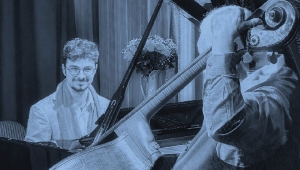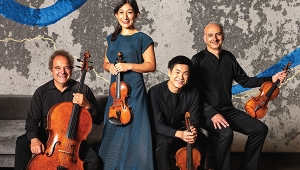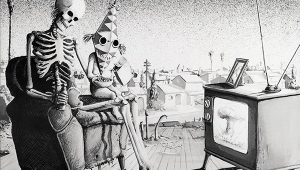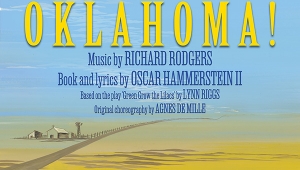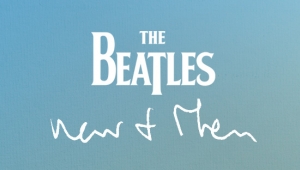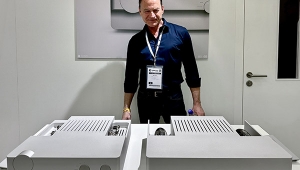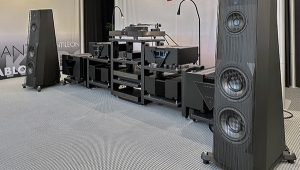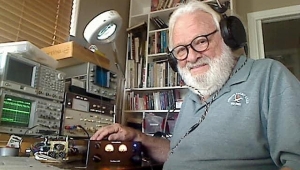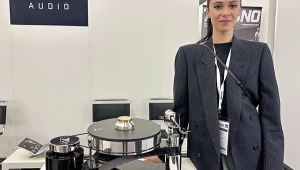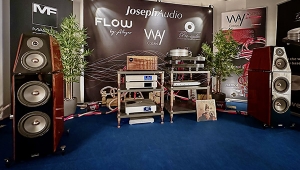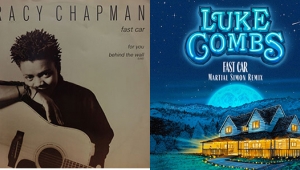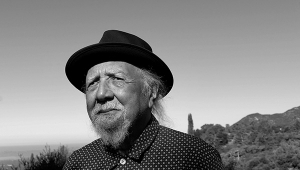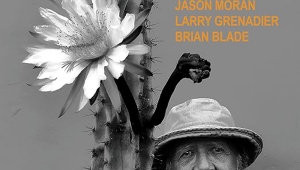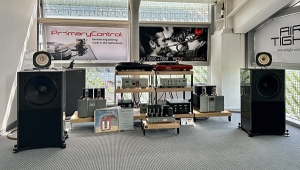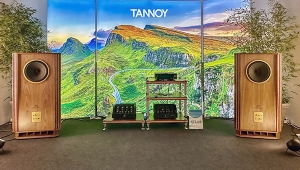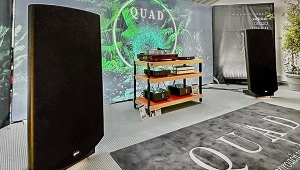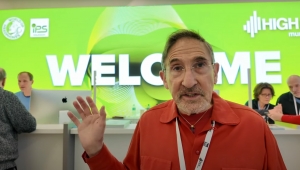| Columns Retired Columns & Blogs |
May 2024 Rock/Pop Record Reviews
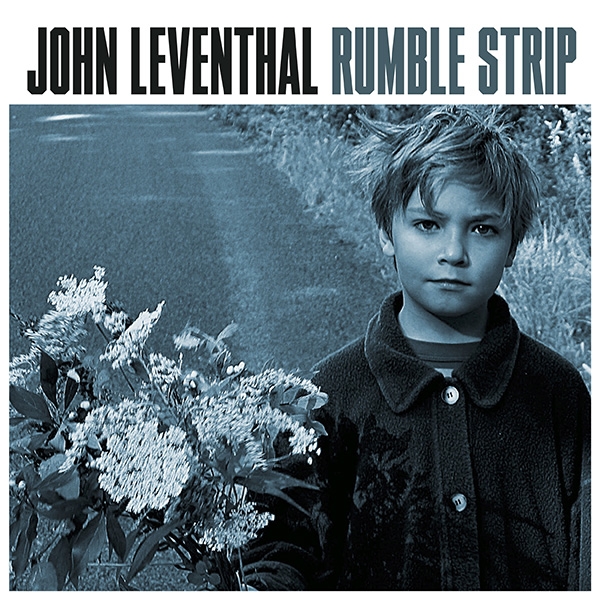
John Leventhal: Rumble Strip
RumbleStrip Records (auditioned as CD). 2024. Leventhal, prod.; Leventhal, Jim Price, Mark Cordell, Gavin Lurssen, engs.
Performance ****
Sonics ****
RumbleStrip Records (auditioned as CD). 2024. Leventhal, prod.; Leventhal, Jim Price, Mark Cordell, Gavin Lurssen, engs.
Performance ****
Sonics ****
Across John Leventhal's 45-year career, he has produced records that won close to 20 Grammy Awards, written songs performed by artists from Joe Cocker to Shawn Colvin, and worked in the studio with musicians as varied as Jackson Browne and Johnny Cash. But until now, he has never occupied the role of "solo artist." That changes with the release of Rumble Strip.
The record combines Leventhal's signature guitar work with his passion for instrumental, classical, soul, country, and jazz-infused improvisational music. The album is assembled like a soundtrack, with instrumentals dominating the record, interspersed by vocal-driven tracks that act like runways and exit ramps. The guitar parts are often layered. They are sharp and never wilt, with a clarity that underscores Leventhal's great command of the instrument. It's a sophisticated sound with presence and purpose.
Despite the prevalence of instrumentals, the record's finest moments are the ones with vocals, by Leventhal and Rosanne Cash, his wife. The vocal songs have a character that feels cautious, dark, and lonesome—all evident, for example, on the single "That's All I Know About Arkansas" and also on "The Only Ghost," co-written with Marc Cohn, originally for Dr. John's final album. Here, the secret sauce simmers on the front burner. Their voices join in ways that induce chills. The songs stick with you long after the record has ended.
Rumble Strip is cinematic in sound and scope but in a way that's personal and sits close. The front and back covers—the boy on the front, the adult on the back—act as a metaphor for the journey captured across the album's 16 tracks, with tales that live between those two life stages, the author of that life winding up older and wiser with 45 years of tales to tell, a few of them told here.—Ray Chelstowski

Umbrellas: Fairweather Friend
Slumber Records SLR282 (CD). 2024. Mathew Ferrara, prod.; Jason Quever, Mark Gardener, engs.
Performance *****
Sonics ****
You might well expect a California band to be bright and sunny, and despite their drizzly name, the Umbrellas lives up to that assumption. The sound on Fairweather Friend is clean and clear, and Jason Quever's mix gives it space and lightness.
The band's four fine vocalists harmonize, but this isn't surf music. The leads, baritone Mathew Ferrara and mezzo-soprano Morgan Alice, their voices alternating across jangly guitars, make the band sound more like Orange Juice, the Scottish band, than the Beach Boys. Fairweather Friend is their second album, and as on their first, the occasional guitar solo reveals a nodding acquaintance with the Velvet Underground and the Byrds.
These guitars, though, do not resemble axes flexing macho power rock, nor even surfboards ready to hang ten; these guitars are more like teddy bears held lovingly with cool, ironic smiles. The rhythm section supports all that with a simple, effective beat. The contrasting voices of Ferrara and Alice, who take turns as lead singer, endow the album with unity while avoiding repetition.
From single and album-opener "Three Cheers!" onward, this is refreshingly breezy pop music. Every song could easily be a single. These are songs of love won, lost, and treasured, that show that light and poppy need not mean superficial. "Blue" and "P.M," which close the album, are cases in point. The latter finishes with the line, "does any of it matter/Or are we better off alone?"
Sonically, it's DIY, straightforward and frill-free—exactly what's needed in this kind of music. In a parallel universe, Fairweather Friend would be a megasuccess, but I fear this might be one of those albums that, though one of the year's best, slips by with little notice. I hope not. As an Englishman in rainy London, I'm drawn to Umbrellas.—Phil Brett

The Who: Live At Shea Stadium, 1982
Mercury Studios 5837222 (auditioned as CD). 2024. Geoff Kempin, Alice Webb, prods.; Richard Whittaker, Bob Pridden, Jon Astley,
engs.
Performance *****
Sonics ***
The Who's 1982 North American tour was intended to be their last. Instead, they'd go on to reunite for Live Aid in 1985, then again, in a new configuration without drummer Kenney Jones, in 1989. But the 1982 tour found the band in perfect rhythm. Their show on the second night of a two-night stand at New York City's Shea Stadium was released on DVD in 2015. Now the first (official) audio-only version is being released, with a set list that's among their strongest ever.
The band was touring It's Hard, their latest album, and four songs from that album populate the set: the album's title track, "Eminence Front," "Cry If You Want," and "Dangerous." Those songs were joined by classics from the 1960s—"Substitute," "I Can't Explain," "Pinball Wizard"—and '70s: "Behind Blue Eyes," "Baba O'Riley," "Won't Get Fooled Again," "Who Are You," and others—plus "The Quiet One" from the 1981 album Face Dances. Rounding things out were several well-known covers including "I Saw Her Standing There," "Twist and Shout," "Young Man Blues," and "Summertime Blues."
The audio-only version of this show loses none of the energy and intensity of the DVD release; In fact, it rather heightens perception of the audible power the band has always been known for. Shea was never known for good acoustics; critical elements of sound can seem to evaporate in space. This recording suffers from tamped-down highs and a muddled bottom, yet Pete Townshend, John Entwistle, and Kenney Jones brought such nuance and style to their playing that it cuts through the clutter and sets an audio altitude that lets you cruise the whole way through.
This record isn't just for completists. It's more than a keepsake: It's a snapshot of a legendary band playing powerful music on a significant tour.—Ray Chelstowski

UFO: Lights Out
Chrysalis CRVX1531 (3 LPs). 1977/2024. James Batsford, reissue project manager; Andy Pearce, Matt Wortham, remastering and cutting engs.
Performance ****
Sonics ****
In 1974, former Scorpions guitarist Michael Schenker joined UK quartet UFO and turned them away from space rock and toward hard rock. Six UFO albums followed, all featuring Schenker's playing and songwriting. 1977's Lights Out broke the band out of the crowded hard-rock wolfpack.
Lights Out, UFO's highest-charting album in the US, was recorded at London's AIR studios. It has now been reissued in the form of this 180gm, triple-LP version, pressed at GZ in the Czech Republic. The mercurial Schenker's guitar provides the backbone of the anthemic title track—oddly sequenced as the closer to side one on the vinyl version—in which Moog howls about the same dystopian London that, in a parallel musical universe, inspired The Clash: "From the backstreets there's a rumblin'/Smell of anarchy/No more nice time, bright boy shoe shines/Pie in the sky dreams." A big reason the band broke out was the violins on the piano-led power ballad "Try Me"; that track has been sharpened considerably in this remastering, relative to the OG pressings.
The biggest surprise here, which shows that UFO was determined to be more than hard-rock blasters, is the violin-backed cover of Love's "Alone Again Or." Fluffed up with fiddles, a dash of Pink Floyd–like spaciousness, and a Schenker solo kept under tight command, closer "Love to Love" is a classic '70s hard rock power ballad.
It's now apparent that UFO was one of a number of bands that wisely recorded many of its live shows. Here, in addition to the remastered original LP, a 1977 show from the Lights Out tour, recorded at London's Roundhouse and remixed for this release, has inferior fidelity but shows that the band, always a well-oiled machine on the road, could bring it with both barrels live.—Robert Baird

Tom Rush: Gardens Old, Flowers New
Appleseed Recordings (auditioned as CD). 2024. Matt Nakoa, prod.; Mikhail Pivovarov, eng.
Performance ****
Sonics *****
Tom Rush was at the leading edge of the 1960's folk movement. Songs of his like "No Regrets" set the stage for what would become the singer-songwriter movement. He helped many musicians who today are better known—Joni Mitchell, Jackson Browne, James Taylor—get started.
Through the mid-1970s, his output was prolific; thereafter, it became sporadic with long gaps between releases. But Rush has always toured regularly, and it appears that at the tender age of 82, he found himself armed with a collection of songs that planted the seeds for what became his first studio record in five years.
Gardens Old, Flowers New is a triumph. Across 14 tracks, the album presents him in a form as fit as ever. These songs are filled with a sense of promise, good-natured humor, and fun.
Throughout, Rush delivers acoustic guitar parts that sit squarely on the contemporary folk foundation he is known for. His playing is clean, precise, and absent flash. That alone might have been enough to make the record memorable. But it's wide-open rockers like "Nothin' But a Man" and "It All Comes Down To Love" that surprise: The arrangements have a sense of youthful abandon, supported by fantastic horn charts and slick electric guitar parts. They feel perfectly modern, with a bounce that balances the record.
The album's title is a line that appears in two of the songs. It conveys the idea that many things in life, like watching your kids grow up or falling in love, have happened millions of times through the ages, yet each time it happens, it is fresh and different.
That's a perfect metaphor for what sets this record apart. It's not that what Rush does here is something new, something he hasn't done before. It's that what he's done here, however often it has been done previously, feels original and familiar at the same time.—Ray Chelstowski
- Log in or register to post comments
